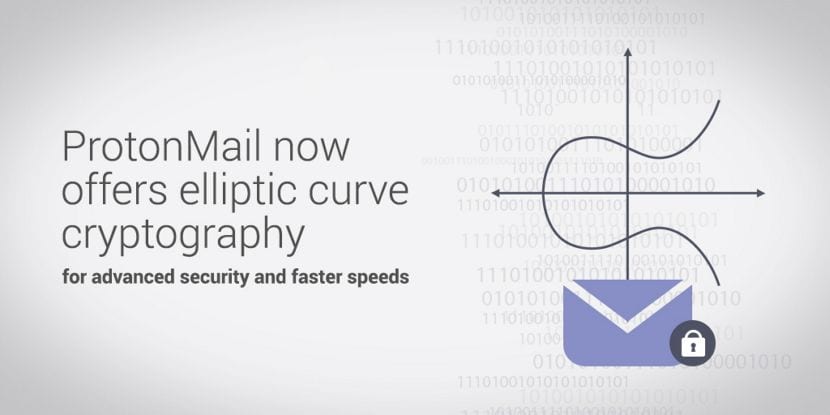
The ProtonMail team announced in a blog post that your secure email service now supports elliptic curve cryptography (ECC) to increase safety and speed.
According to the blog post, the company has been working for several months to set up support for new cryptographic methods that offer a faster experience with equal or greater security.
ECC comes to ProtonMail
Elliptical curve cryptography is the most advanced cryptographic system available and the ProtonMail team now makes this technology available to all users on all web, mobile and desktop applications of the email service.
ProtonMail has built a reputation for email security, privacy, and ease of use.
The company made the decision to include elliptic curve crypto in addition to RSA encryption. However, now the ECC will become the default standard for all new addresses in ProtonMail and the ProtonMail team gives existing users, by posting their blog post, the opportunity to update their RSA addresses.
ECC is one of the most powerful types of crypto.
It is the next generation of public key cryptography, and it is based on mathematics. It provides a much more secure foundation than first generation public key cryptography systems like RSA.
ECC could be a future standard
More and more websites are using ECC to protect everything from clients' HTTPS connections to the way data is transmitted between data centers.
According to the ProtonMail team, if the user is concerned about ensuring the highest level of security while maintaining performance, then ECC is a smart choice.
According to the blog post, users may already be using this crypto in other services, like WhatsApp, Chrome, Firefox, Opera and Tor.
The RSA-based public key cryptography system, also mathematically based, has been the standard in the field for decades.
Elliptical Curve Cryptography (ECC) is more secure
According to the PrtonMail team, public key cryptosystems, whether they are high-bit RSA curves or elliptical curves, are extremely secure.
However, the only practical way for attackers to hack any encryption system is to exploit the weaknesses of its implementation, the team wrote.
“With ECC, there are only two known attacks, one that takes advantage of random number generators and the other that exploits things like device power consumption to collect indexes on keys. These two elements are well understood and have been mitigated for years, ”the team wrote.
“We chose a particular elliptical curve system called X25519, which is fast, safe and particularly resistant to synchronization attacks. "It's easy to implement and, for what it's worth, it's not the subject of any patent claims," the team added.
Pending the arrival of quantum computers, the company has adopted ECC keys which will become the default keys for all new addresses in ProtonMail. The company invites users who already have a ProtonMail account to update their RSA keys for each email address.
Old accounts will also be able to enjoy ECC
To update your account, sThey should only follow the following instructions:
- Connect to your existing ProtonMail account
- In it they should go to Settings
- access key menu
- click the button «Add new password» and select the address you want to add keys to ECC and click next
- Then select "X25519 (Modern, Fast, Secure)" and then click on generate keys . They will be asked to enter their account password.
- In the row for the ECC key, click in the drop-down menu and select "Make Main".
This will make ECC the default password for this email address.
The company recommends that you do not delete old RSA keys, as doing so will lose the ability to decrypt all your existing emails.